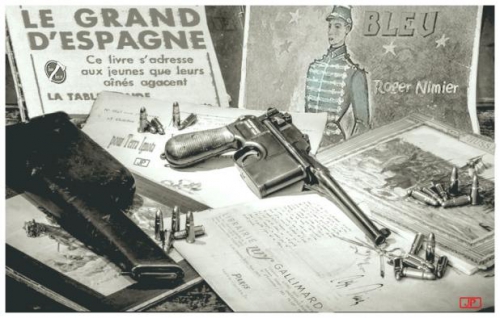
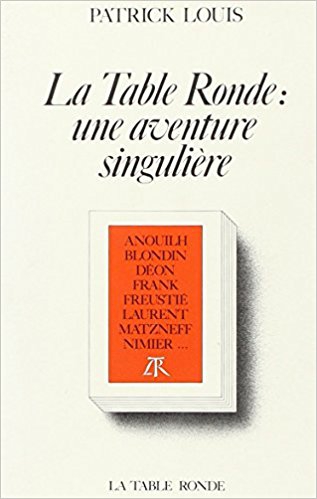
En poursuivant votre navigation sur ce site, vous acceptez l'utilisation de cookies. Ces derniers assurent le bon fonctionnement de nos services. En savoir plus.

par Pierre Poucet
Ex: http://www.oragesdacier.info


16:07 Publié dans Littérature | Lien permanent | Commentaires (0) | Tags : table ronde, littérature, lettres, lettres françaises, littérature française, france, années 50, roger nimier |  |
|  del.icio.us |
del.icio.us |  |
|  Digg |
Digg | ![]() Facebook
Facebook
15:49 Publié dans Actualité, Economie | Lien permanent | Commentaires (0) | Tags : actualité, f. william engdahl, politique internationale, géopolitique, économie, monnaie, devises, argent liquide, finance |  |
|  del.icio.us |
del.icio.us |  |
|  Digg |
Digg | ![]() Facebook
Facebook
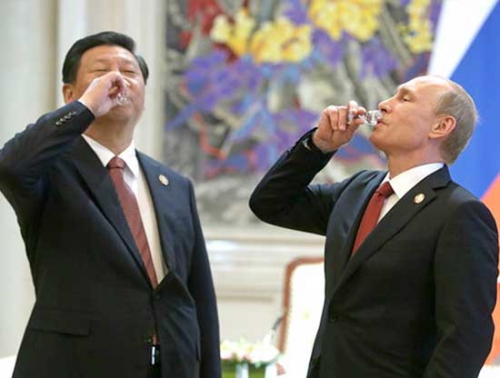
By Federico Pieraccini
Strategic Culture
Once in a while, think tanks such as the Brookings Institute are able to deal with highly strategic and current issues. Often, the conferences held by such organizations are based on false pretences and copious banality, the sole intention being to undermine and downplay the efforts of strategic opponents of the US. Recently, the Brookings Institute’s International Strategy and Strategy Project held a lecture on May 9, 2017 where it invited Bobo Lo, an analyst at Lowy Institute for International Policy, to speak. The topic of the subject, extremely interesting to the author and mentioned in the past, is the strategic partnership between China and Russia.
The main assumption Bobo Lo starts with to define relations between Moscow and Beijing is that the two countries base their collaboration on convenience and a convergence of interests rather than on an alliance. He goes on to say that the major frictions in the relationship concern the fate that Putin and Xi hold for Europe, in particular for the European Union, in addition to differences of opinions surrounding the Chinese role in the Pacific. In the first case, Lo states that Russia wants to end the European project while China hopes for a strong and prosperous Europe. With regard to the situation in the Pacific, according to this report, Moscow wants a balance of power between powers without hegemonic domination being transferred from Washington to Beijing.
The only merit in Lo’s analysis is his identification of the United States as the major cause of the strategic proximity between Moscow and Beijing, certainly a hypothesis that is little questioned by US policy makers. Lo believes Washington’s obsession with China-Russia cooperation is counterproductive, though he also believes that the United States doesn’t actually possess capabilities to sabotage or delimit the many areas of cooperation between Beijing and Moscow.
What is missing in Lo’s analysis are two essential factors governing how Moscow and Beijing have structured their relationship. China and Russia have different tasks in ushering in their world order, namely, by preserving global stability through military and economic means. Their overall relationship of mutual cooperation goes beyond the region of Eurasia and focuses on the whole process of a sustainable globalization as well as on how to create an environment where everyone can prosper in a viable and sustainable way. Doing this entails a departure from the current belligerent and chaotic unipolar world order.
Moscow and Beijing: Security and Economy
Beijing has been the world’s economic engine for over two decades and shows no signs of slowing down, at least not too much. Moscow, contrary to western media propaganda, has returned to play a role not only on a regional scale but as a global power. Both of these paths of military and economic growth for China and Russia have set things on a collision course with the United States, the current global superpower that tends to dominate international relations with economic, political and military bullying thanks to a complicit media and corrupt politicians.
In the case of Beijing, the process of globalization has immensely enhanced the country, allowing the Asian giant to become the world’s factory, enabling Western countries to outsource to low-cost labor. In this process of economic growth, Beijing has over the years gone from being a simple paradise for low-cost outsourcing for private companies to being a global leader in investment and long-term projects. The dividends of years of wealth accumulation at the expense of Western nations has allowed Beijing to be more than just a strategic partner for other nations. China drives the process of globalization, as recently pointed out by Xi Jinping in Davos in a historic speech. China’s transition from a harmless partner of the West to regional power with enormous foreign economic investments place the country on a collision course with Washington. Inevitably, Beijing will become the Asian hegemon, something US policymakers have always guaranteed will not be tolerated.
The danger Washington sees is that of China emerging as a regional superpower that will call the shots in the Pacific, the most important region of the planet. The United States has many vested interests in the region and undeniably sees its future as the leader of the world order in jeopardy. Obama’s pivot to Asia was precisely for the purposes of containing China and limiting its economic power so as to attenuate Beijing’s ambitions.
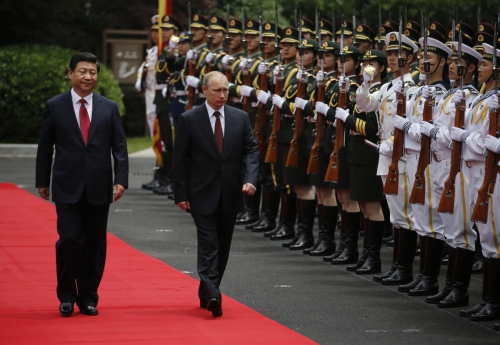
Unsurprisingly, Washington’s concerns with Moscow relate to its resurgence in military capabilities. Russia is able to oppose certain objectives of the United States (see Ukraine or Syria) by military means. The possibility of the Kremlin limiting American influence in Eastern Europe, the Middle East and Eurasia in general is cause for concern for American policy makers, who continue to fail to contain Russia and limit Moscow’s spheres of influence.
In this context, the strategic division of labor between Russia and China comes into play to ensure the stability of the Eurasian region as a whole; in Asia, in the Middle East and in Europe. To succeed in this task, Moscow has mainly assumed the military burden, shared with other friendly nations belonging to the affected areas. In the Middle East, for example, Tehran’s partnership with Moscow is viewed positively by Beijing, given its intention to stabilize the region and to eradicate the problem of terrorism, something about which nations like China and Russia are particularly concerned.
The influence of Islamist extremists in the Caucasian regions in Russia or in the autonomous region of Xinjiang in China are something that both Putin and Xi are aware can be exploited by opposing Western countries. In North Africa, Egypt has signed several contracts for the purchase of military vehicles from Moscow, as well as having bought the two Mistral ships from France, thereby relying on military supplies from Moscow. It is therefore not surprising that Moscow and Egypt cooperated with the situation in Libya and in North Africa in general.
In Southeast Asia, Moscow seeks to coordinate efforts to reach an agreement between Afghanistan, Pakistan and India. The entry into the Shanghai Cooperation Organization (SCO) of New Delhi and Islamabad (Tehran will be next), with the blessing of Beijing as the protagonist of the 2017 SCO meeting, is a keystone achievement and the right prism through which to observe the evolution of the region. Moscow is essentially acting as a mediator between the parties and is also able to engage with India in spite of the dominating presence of China. The ultimate goal of Moscow and Beijing is to eradicate the terrorist phenomenon in the Asian region with a view to what is happening in North Africa and the Middle East with Iran and Egypt.
Heading to a Multipolar World Order
The turning point in relations between Moscow and Beijing concerns the ability to engage third countries in military or economic ways, depending on these countries’ needs and objectives. Clearly in the military field it is Moscow that is leading, with arms sold to current and future partners and security cooperation (such as with ex-Soviet Central-Asian republics or in the Donbass) and targeted interventions if needed, as in Syria. Beijing, on the other hand, acts in a different way, focusing on the economic arena, in particular with the Asian Infrastructure Investment Bank (AIIB) at its center.
Initiatives such as the One Belt One Road (OBOR) and the Maritime Silk Road have the same strategic aim of the Russian military initiative, namely, ensuring the independence of the region from a geo-economic perspective, reaching win-win arrangements for all partners involved. Naturally, the win-win agreement does not mean that China wins and then wins again; rather, a series of bilateral concessions can come to satisfy all actors involved. An important example in this regard that explains the Sino-Russian partnership concerns the integration of the Eurasian Union with the Chinese Silk Road. The Russian concerns over the predominant status of the Chinese colossus in Central Asia have been assuaged by a number of solutions, such as the support of the OBOR infrastructure program to that of the Eurasian Union. Beijing is not interested in replacing Moscow’s leading role the post-Soviet nations in Central Asia but rather with providing significant energy and economic development to particularly underdeveloped nations that are in need of important economic investment, something only Beijing is able to guarantee.
The linking of the Eurasian Economic Union (EEU) with the One Belt One Road initiative guarantees Moscow a primary role in the transit of goods from east to west, thereby becoming the connecting point between China and Europe while expanding the role and function of the EEU. All participants in these initiatives have a unique opportunity to expand their economic condition through this whole range of connections. Beijing guarantees the money for troubled countries, and Moscow the security. The SCO will play a major role in reducing and preventing terrorist influence in the region, a prerequisite for the success of any projects. Also, the AIIB, and to some extent the BRICS Development Bank, will also have to step in and offer alternative economic guarantees to countries potentially involved in these projects, in order to free them from the existing international financial institutions.
One Belt One Road, and all the related projects, represent a unique occasion whereby all relevant players share common goals and benefits from such transformative geo-economic relationships. This security-economy relationship between Moscow and Beijing is the heart of the evolution of the current world order, from the unipolar to the multipolar world. The US cannot oppose China on the economic front and Russia on the military front. It all comes down to how much China and Russia can continue to provide and guarantee economic and security umbrellas for the rest of the world.
15:30 Publié dans Actualité, Eurasisme, Géopolitique | Lien permanent | Commentaires (0) | Tags : actualité, eurasisme, géopolitique, politique internationale, chine, russie, monde multipolaire, multipolarité |  |
|  del.icio.us |
del.icio.us |  |
|  Digg |
Digg | ![]() Facebook
Facebook
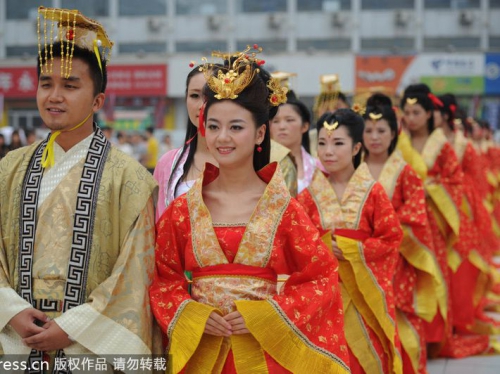
Ex: https://www.edge.org
China has been running the world's largest and most successful eugenics program for more than thirty years, driving China's ever-faster rise as the global superpower. I worry that this poses some existential threat to Western civilization. Yet the most likely result is that America and Europe linger around a few hundred more years as also-rans on the world-historical stage, nursing our anti-hereditarian political correctness to the bitter end.
When I learned about Chinese eugenics this summer, I was astonished that its population policies had received so little attention. China makes no secret of its eugenic ambitions, in either its cultural history or its government policies.
For generations, Chinese intellectuals have emphasized close ties between the state (guojia), the nation (minzu), the population (renkou), the Han race (zhongzu), and, more recently, the Chinese gene-pool (jiyinku). Traditional Chinese medicine focused on preventing birth defects, promoting maternal health and "fetal education" (taijiao) during pregnancy, and nourishing the father's semen (yangjing) and mother's blood (pingxue) to produce bright, healthy babies (see Frank Dikötter's book Imperfect Conceptions). Many scientists and reformers of Republican China (1912-1949) were ardent Darwinians and Galtonians. They worried about racial extinction (miezhong) and "the science of deformed fetuses" (jitaixue), and saw eugenics as a way to restore China's rightful place as the world's leading civilization after a century of humiliation by European colonialism. The Communist revolution kept these eugenic ideals from having much policy impact for a few decades though. Mao Zedong was too obsessed with promoting military and manufacturing power, and too terrified of peasant revolt, to interfere with traditional Chinese reproductive practices.
But then Deng Xiaoping took power after Mao's death. Deng had long understood that China would succeed only if the Communist Party shifted its attention from economic policy to population policy. He liberalized markets, but implemented the one-child policy —partly to curtail China's population explosion, but also to reduce dysgenic fertility among rural peasants. Throughout the 1980s, Chinese propaganda urges couples to have children "later, longer, fewer, better"—at a later age, with a longer interval between birth, resulting in fewer children of higher quality. With the 1995 Maternal and Infant Health Law (known as the Eugenic Law until Western opposition forced a name change), China forbade people carrying heritable mental or physical disorders from marrying, and promoted mass prenatal ultrasound testing for birth defects. Deng also encouraged assortative mating through promoting urbanization and higher education, so bright, hard-working young people could meet each other more easily, increasing the proportion of children who would be at the upper extremes of intelligence and conscientiousness.
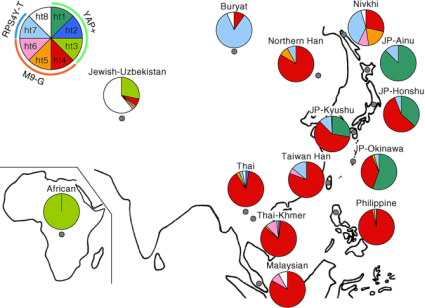
One of Deng's legacies is China's current strategy of maximizing "Comprehensive National Power". This includes economic power (GDP, natural resources, energy, manufacturing, infrastructure, owning America's national debt), military power (cyberwarfare, anti-aircraft-carrier ballistic missiles, anti-satellite missiles), and 'soft power' (cultural prestige, the Beijing Olympics, tourism, Chinese films and contemporary art, Confucius Institutes, Shanghai's skyscrapers). But crucially, Comprehensive National Power also includes "biopower": creating the world's highest-quality human capital in terms of the Chinese population's genes, health, and education (see Governing China's Population by Susan Greenhalgh and Edwin Winkler).
Chinese biopower has ancient roots in the concept of "yousheng" ("good birth"—which has the same literal meaning as "eugenics"). For a thousand years, China has been ruled by a cognitive meritocracy selected through the highly competitive imperial exams. The brightest young men became the scholar-officials who ruled the masses, amassed wealth, attracted multiple wives, and had more children. The current "gaokao" exams for university admission, taken by more than 10 million young Chinese per year, are just the updated version of these imperial exams—the route to educational, occupation, financial, and marital success. With the relaxation of the one-child policy, wealthier couples can now pay a "social fostering fee" (shehui fuyangfei) to have an extra child, restoring China's traditional link between intelligence, education, wealth, and reproductive success.
Chinese eugenics will quickly become even more effective, given its massive investment in genomic research on human mental and physical traits. BGI-Shenzhen employs more than 4,000 researchers. It has far more "next-generation" DNA sequencers that anywhere else in the world, and is sequencing more than 50,000 genomes per year. It recently acquired the California firm Complete Genomics to become a major rival to Illumina.
The BGI Cognitive Genomics Project is currently doing whole-genome sequencing of 1,000 very-high-IQ people around the world, hunting for sets of sets of IQ-predicting alleles. I know because I recently contributed my DNA to the project, not fully understanding the implications. These IQ gene-sets will be found eventually—but will probably be used mostly in China, for China. Potentially, the results would allow all Chinese couples to maximize the intelligence of their offspring by selecting among their own fertilized eggs for the one or two that include the highest likelihood of the highest intelligence. Given the Mendelian genetic lottery, the kids produced by any one couple typically differ by 5 to 15 IQ points. So this method of "preimplantation embryo selection" might allow IQ within every Chinese family to increase by 5 to 15 IQ points per generation. After a couple of generations, it would be game over for Western global competitiveness.
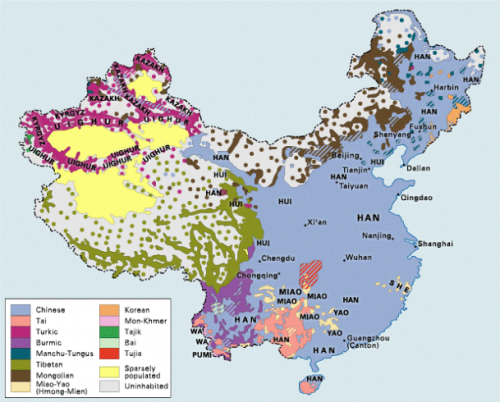
There is unusually close cooperation in China between government, academia, medicine, education, media, parents, and consumerism in promoting a utopian Han ethno-state. Given what I understand of evolutionary behavior genetics, I expect—and hope—that they will succeed. The welfare and happiness of the world's most populous country depends upon it.
My real worry is the Western response. The most likely response, given Euro-American ideological biases, would be a bioethical panic that leads to criticism of Chinese population policy with the same self-righteous hypocrisy that we have shown in criticizing various Chinese socio-cultural policies. But the global stakes are too high for us to act that stupidly and short-sightedly. A more mature response would be based on mutual civilizational respect, asking—what can we learn from what the Chinese are doing, how can we help them, and how can they help us to keep up as they create their brave new world?
00:53 Publié dans Science, Sciences | Lien permanent | Commentaires (0) | Tags : science, génétique, eugénisme, chine, asie, affaires asiatiques, sciences biologiques, biologie humaine, biologie, haplogroupes |  |
|  del.icio.us |
del.icio.us |  |
|  Digg |
Digg | ![]() Facebook
Facebook